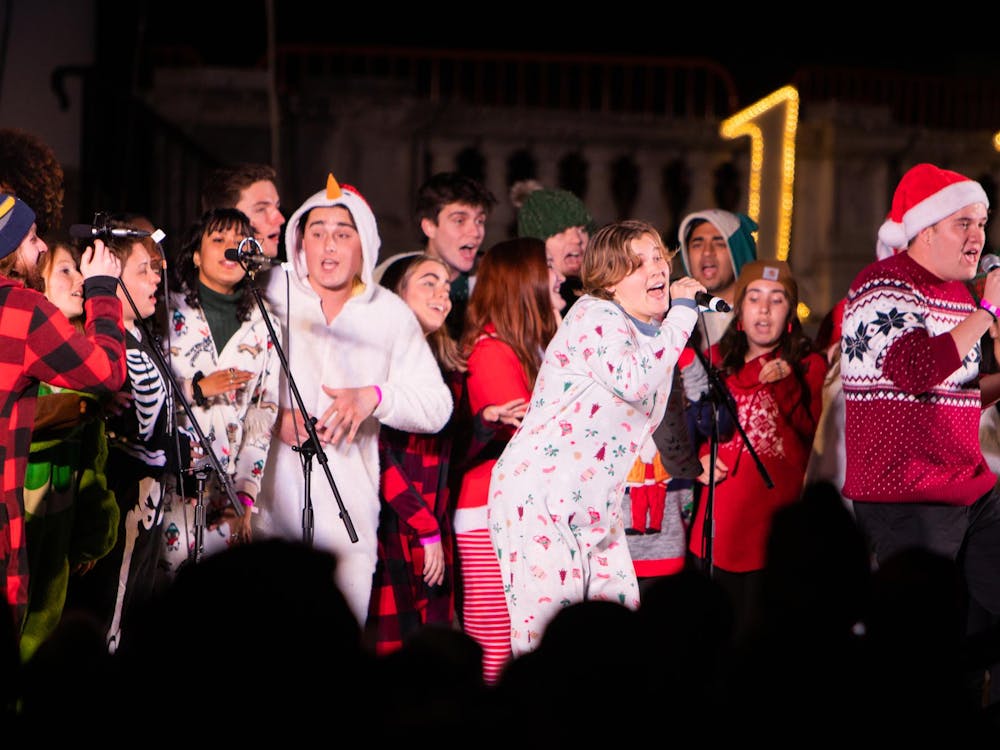"I am not a minority. I am minor to no one."
"As a black male I have to worry about how I walk. I see people pick up their pace when I walk by."
"Diversity has become nothing but a buzz word."
At last Wednesday's State of Race Relations Report, everyone had something to say. An estimated 250 to 300 students and administrators attended and heard the most outspoken students speak on one of the University's most sensitive subjects. At an event determined to arrive at solutions about race relations, the majority of those sitting in the Chemistry Auditorium were students of color, while many white students stayed home.
Fourth-year College student Aisha Lloyd, co-founder of the multicultural organization UniTE, said she can understand why some white students may be hesitant to attend.
|
"Because of the historical implications, especially between blacks and whites, white students could be afraid that others would simply bash their race," said Lloyd, who served as one of the seven student panelists. "Also, white students may not feel like they have a true culture, since being white is to be the norm."
During the forum, some of Lloyd's fears proved true. When the inevitable topic of racial segregation in University housing was discussed, a call went out for any student in Lambeth to explain their housing decision. Second-year College student Ben Schenkier, a white male, took the microphone, only to be yelled at by a white female from the audience.
"I chose to live in Lambeth because I like the set-up and I heard it was a nice place to live," Schenkier said.
"And because it's close to Rugby Road, right?" she yelled, only to applause from the stands.
As anger toward the Greek system came out, Inter-Fraternity Council Education Chair Tim Roscoe, a fourth-year College student, spoke to the audience and fellow panelists about diversity issues in the Greek system.
|
"Yeah, but can I get into your house on Saturday?" asked a black student from the third row.
Fourth-year Commerce student Ronnie Washington, another panelist, noted that the audience "wasn't as diverse as it could've been." Washington said he has attended similar racial forums in the past, such as Reflections on Complexion, an annual event sponsored by B.U.C.K.S. -- Brothers United Celebrating Knowledge and Success. He observed that "often the same people show up at these events, to the point that you're almost preaching to the choir."
"Fundamentally, it comes down to the fact that minority students are constantly aware of their skin color," Washington said. "For whites, their race only becomes an issue when they find themselves the minority in a situation. There is not the same impetus for them to attend" race discussions.
Organized by third-year Commerce student Brett Gibson and third-year College student Michael Freedman-Schnapp, both white males, the forum focused on a breakdown of results from a survey conducted by the State of Race Relations last spring. The dialogue after the statistical analysis allowed for audience participation with the goal of forming positive suggestions for future efforts.
Cheryl Cox, a fourth-year College student, joined the State of Race Relations effort last fall. She worked along with Gibson and Freedman-Schnapp, interviewing students for the phone survey and organizing the event itself. Cox said she can see how some white students may not feel the need to attend such a discussion.
"I think that when people hear about the subject of race they assume that it's only something for minorities," Cox said. "This is really something that affects all of us."
Before the event, William Harmon, Vice President for Student Affairs, approved an e-mail advertising the event for distribution to the student body. Cox, who composed the email, received about 25 e-mails in response to the publicity, the majority of them bashing her for continuing race discussions at the University.
"You expect a certain amount of respect from people at a university where we are all supposed to be considered intelligent," Cox said.
Roscoe, who said he was dissatisfied with the attendance of white students, believes the students in attendance have the responsibility to make change.
"We need to encourage these students to go back and talk to their friends who didn't come to the forum," Roscoe said. "People must let the dialogue continue beyond the event. The event itself is only the beginning."
Roscoe said he hopes that since professors and administrators are a more constant force than students at the University, more faculty will see the need to get involved.
Practicing what he preached, Roscoe and Tehama Lopez, fellow panelist and fourth-year College student, are working with other members of the Greek system and Hispanic community to come to closure over last year's Beta Bridge incident. La Sociedad Latina painted the bridge last March to raise awareness of Hispanic Heritage Week, only to have the bridge defiled with ethnic slurs by members of a fraternity.
"I want those [fraternity] brothers to understand the consequences of their actions," Lopez said. "Respect, sincerity, accountability and justice are the things in question. I don't want to harp on the issue, but Tim Roscoe seems very sincere about this. I have hope."
Tamara Stitt, a fourth-year College student of Dominican descent, took to the floor Wednesday near the end of the audience participation portion. She said she wanted to emphasize the survey's error in classifying students as Latino. Stitt's microphone was taken away, because her comment did not seem solution-oriented. Stitt said she sees education as the first part of the answer.
"Latino is an ethnicity or culture that encompasses many races," Stitt said. "It is a socially-constructed term created to lump a group of diverse people into a box."
She said that by talking and actively listening to one another, students can "educate and be educated, and share their experiences honestly and openly" and then work toward change.
Freedman-Schnapp said he considers comfort levels as a primary issue and a reevaluation of certain groups as the solution. In his closing remarks, he mentioned University Guides, the Jefferson Literary and Debate Society, Honor and Student Council as being traditionally white organizations.
"My mission is that students at U.Va. learn to trust each other and are comfortable. They have to find some place of comfort," he said. "These organizations don't realize that they're white student organizations. They think they're neutral."
After the forum, Student Council decided to form a "student leader's alliance to find ways to promote multi-cultural involvement and extend a more welcoming feeling to all students," Gibson said.
Washington built on earlier suggestions for programs to bring students of different races together by supporting interracial service projects. Students could then "help themselves and the community at the same time," Washington said.
"We need to focus on shifting the dialogue to the individual," Washington said during his closing remarks. "You need to go out and put yourself out there, and by doing so you become part of the solution."
Gibson said he sees such service projects as being the best solution presented at the conclusion of the meeting. He said he believes that this is the best way to get particularly white students involved. Gibson emphasized that efforts are underway, with "the Virginia Service Coaltion already mediating several multi-organization service projects."
Fourth-year College student Stephanie Hsu reiterated Washington's emphasis on individual accountability. Hsu said she believes that certain factors must be established before people can deal with diversity issues beyond the individual.
"I think when we think about diversity we think of empathy for others and reaching out, but we need to start the dialogue at an internal level," she said. "We need to examine our privileges, prejudices, and think about our circle of friends, upbringing and background."
At the end of the over two-hour session, Dean M. Rick Turner from the Office of African American Affairs commended the efforts of the students involved in the evening.
"Everyone here is part of the solution to the problem," Turner said.
As a result of the forum, non-white and white students alike have stepped up to the plate to attack some of the most controversial issues surrounding the community. Though some may have left discouraged, many who remained until the end managed to take down contact information and schedule future meetings focused on progress. Lopez believes overcoming apathy and intimidation were key to forward movement.
"Race is an issue that concerns all of us at the same level," Lopez said. "We don't need to fear each other. We're all about the same age and one thing we have in common is we're trying to better ourselves through education"




